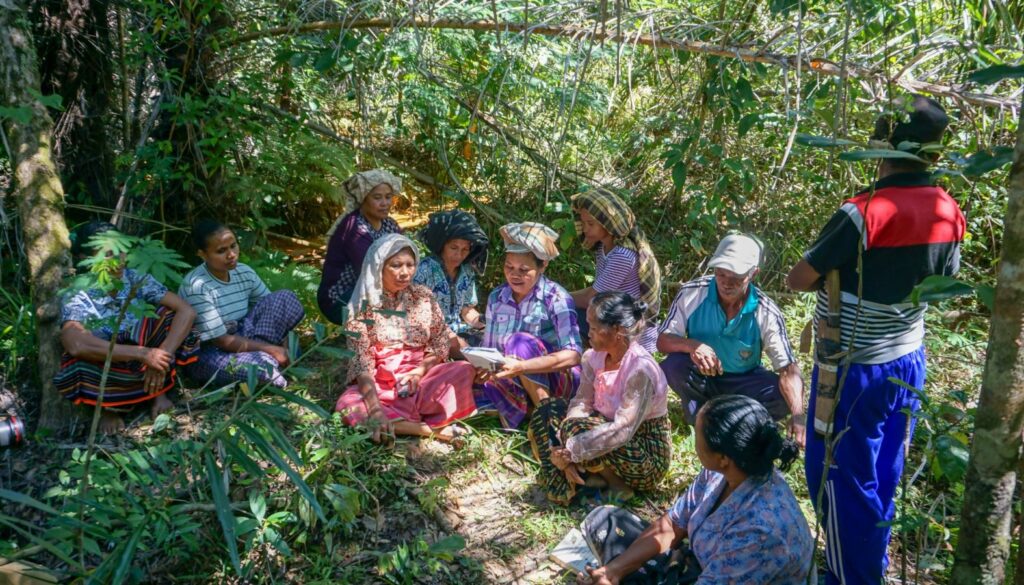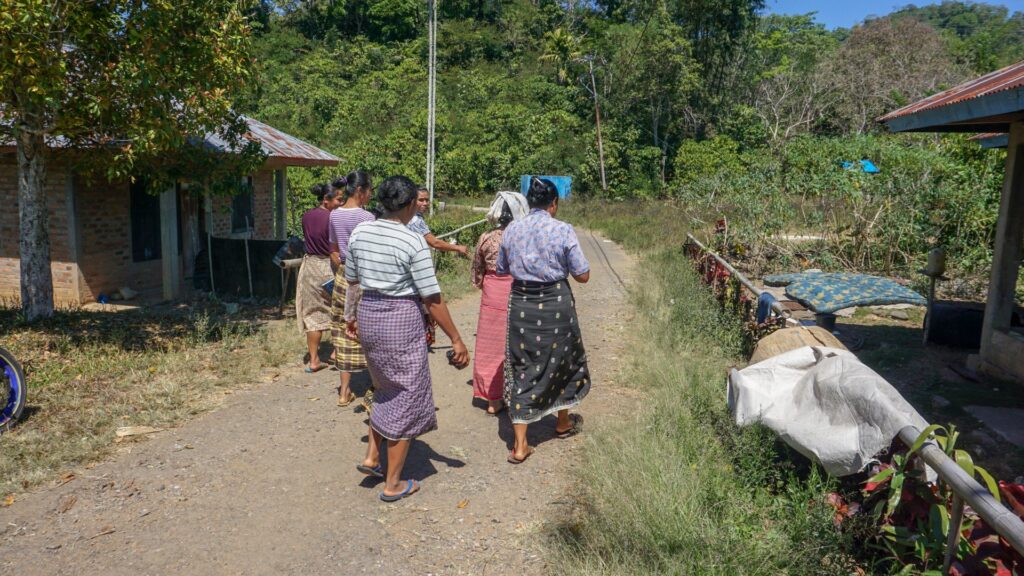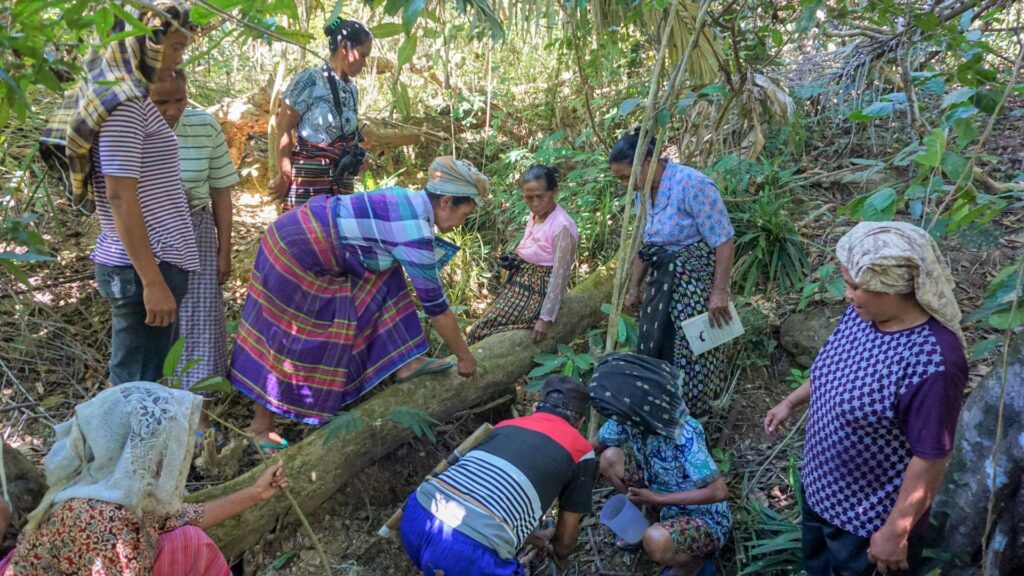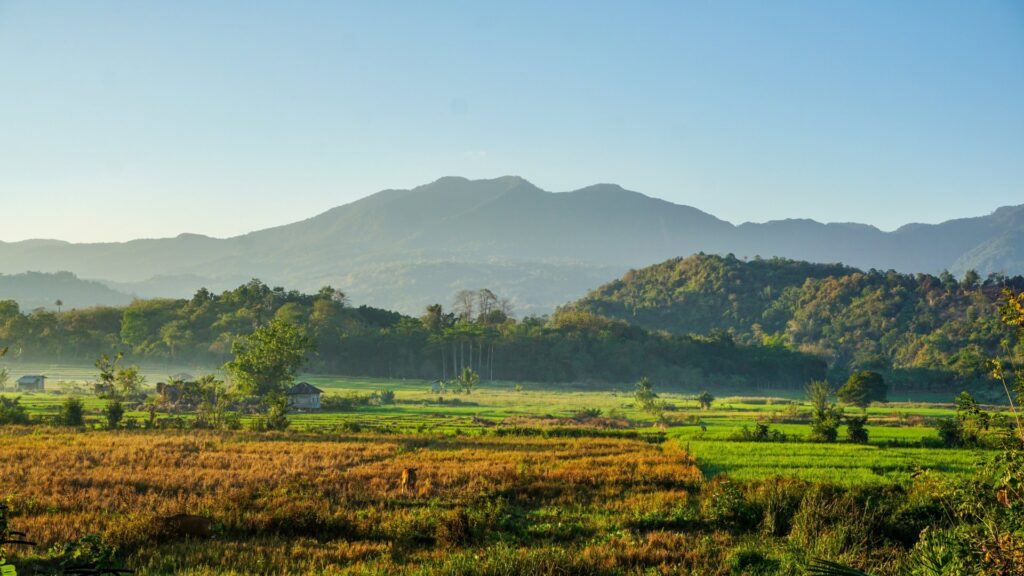From rural housewives to Mother Guards of the forest

Meet the “Mama-Mama Penjaga Mbeliling” – a group of Indonesian women who believe their duty of care extends far beyond just their children. Taking the future of the forest under their wing, they are unafraid to challenge destructive practices.
This article is adapted from a story originally published in the Indonesian newspaper Kompas in Bahasa.
Skolastika M. Erimina, 57, holds a one-litre plastic jug to the water spring and starts counting. When the jug is full to the brim, she makes a note, compares with the previous page and smiles: four seconds faster than last year. The faster water flow rate will bring joy to the people of Golo Damu Village in West Manggarai Regency, Flores, Indonesia – this means they will get clean water more easily in the coming dry season from May to October.
With no guarantee of a reliable water supply year to year, village life really hangs in the balance here. But it wasn’t always like this. The situation got bad when Wae Ndamer Spring, one of the area’s crucial water sources, dried up because of massive logging and hunting in the Puar Lolo Forest area. Deforestation for agricultural land clearance, furniture-making materials and commercial timber disrupted the forest’s ability to control the water cycle. Further, widespread hunting was damaging bird populations and preventing them “replanting” trees in their role as nature’s seed-dispersal agents. The ecosystem in the area was therefore no longer balanced.
The most affected group were the housewives of Golo Damu. They are the ones responsible for cooking and washing, and when the local water supply runs out, the burden of a demanding journey on foot to seek water falls to them. It follows, then, that they were also the most motivated to do something about it.
By Cressida Stevens
Header image © Muhammad Meisa

Since 2009, the enterprising housewives of the “Kembang Mekar” (“blooming flower”) group have been journeying into the forest of Mbeliling District equipped with books, binoculars and a plastic jug, on a mission: to secure a more reliable water supply for the futures of their children and grandchildren. With their basic but trustworthy tools, they carry out monitoring acitivites in the forest.
On arrival at the site, each woman gets to work on her respective duty. Some, like Skolastika, check on the spring and measure the flow rate. Others take out the trusty field guide and watch and listen, carefully recording each bird sighting and song in their notebooks. And they attend to the forest itself – measuring tree conditions, recording incidents of logging and planting new trees. When the field work is done, they analyse their findings and compile them all into a report to share with relevant parties.

But how did this local network of rural women come to be environmental monitoring experts? Unpredictably, the group started out in 2008 as a loans and savings business. Comprised of 24 people, all of them housewives, their motivation was much the same as it is for forest monitoring – to improve the future prospects of their children. Due to their parents’ poor income, many were unable to pursue their career ambitions without getting into terrible debt with loan sharks, but thanks to the business, several children have earned university degrees and are now working in graduate jobs. Then, a year after start-up, the group got involved with Burung Indonesia (BirdLife’s Partner in Indonesia).
Mbeliling is a priority site for the conservation work of Burung Indonesia and one of the landscapes in BirdLife’s Forest Landscape Sustainability Accelerator. This 94,000 hectare landscape comprises approximately 73% forest and is home to dozens of endemic bird species, some of which are threatened with extinction, such as the Flores Hawk-eagle Nisaetus floris and Flores Scops-owl Otus alfredi. In addition, Mbeliling is an important water source, both for agricultural activities and the daily needs of local communities.

“When it comes to conservation, we cannot be separated from the locals at the location. They are the closest and most affected, but their ability to manage their natural environment is limited,” said Tiburtius Hani, Burung Indonesia’s Programme Manager in Flores.
Working with rural and indigenous communities is a cornerstone of BirdLife’s EU-funded forest governance work. Investing in people on the ground that will take care of the forest not only improves prospects for conservation, but can also improve the quality of life for those living in forest communities.
Burung Indonesia provided the aspiring group of women with the training needed to carry out “Natural Services Monitoring”. They were asked to safeguard the forest and to plant trees, and they were equipped with tools for monitoring the birds and the water supply. “We approached them first because they are the most vulnerable, and they work in solidarity with great focus on their work.” Tiburtius explains.
With an organisational structure already in place, the women were quick to rise to this new challenge and are unafraid to use their voice when their precious forest home is mistreated: “In 2014, a company carried out logging and land clearing over the spring. We reported the company to the Forest Service Office and finally, it left. There were also people who hunted the birds here and we asked them to leave. This is our forest,” says Skolastika.
Led by Skolastika, the group has now admitted ten men (bringing its number up to 38 members) and local communities are enjoying the fruits of their hard work. Besides clean water, the melodies of birds are heard more frequently in the village and they also help pollinate commodity crops, such as cloves.
Land development still threatens Mbeliling. Proximity to increasingly popular tourist destinations means the ecosystem is at risk of being thrown further off balance if this is not developed sensitively. But one thing’s for certain: this resilient group of women, armed with the scientific knowledge gathered from their work, will do all that is in their power to keep the forest standing, the birds singing and prevent their spring drying up again.
More about the project
Title: Strengthening non-state actor involvement in forest governance in Indonesia, Malaysia, the Philippines, and Papua New Guinea
Lead Partner: BirdLife International
National Partners: Burung Indonesia (BirdLife Indonesia); Malaysian Nature Society (BirdLife Malaysia); Haribon Foundation (BirdLife in the Philippines); Tenkile Conservation Alliance (Papua New Guinea).
Training and Technical Partners: University of Papua New Guinea; Centre for International Development & Training
Funded by: European Union

www.birdlife.org/forest-governance
The contents of this publication are the sole responsibility of BirdLife International and can in no way be taken to reflect the views of the European Union.